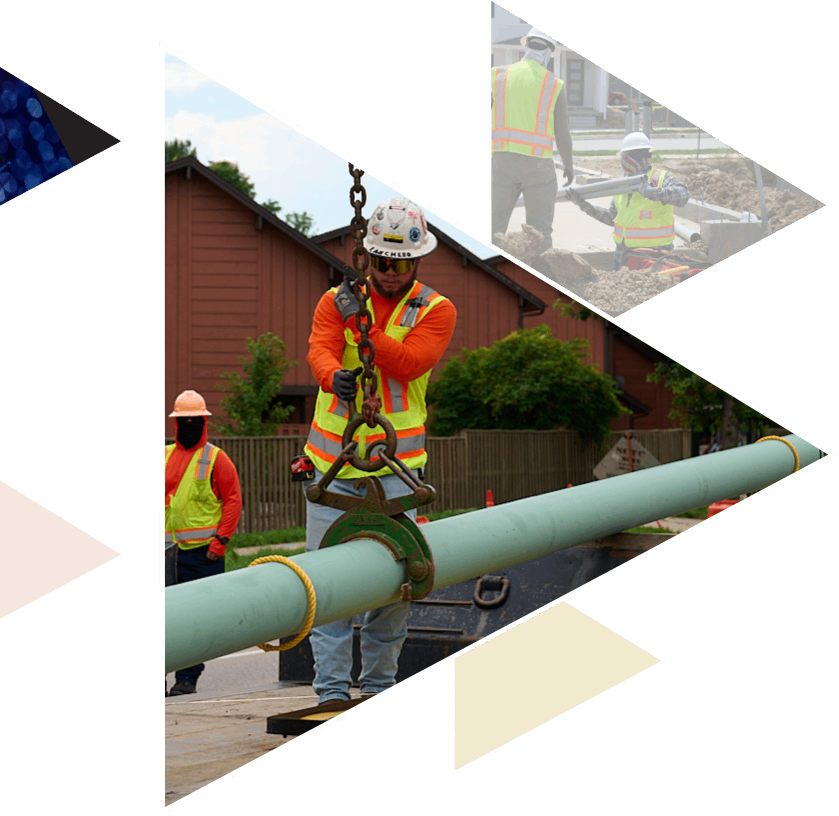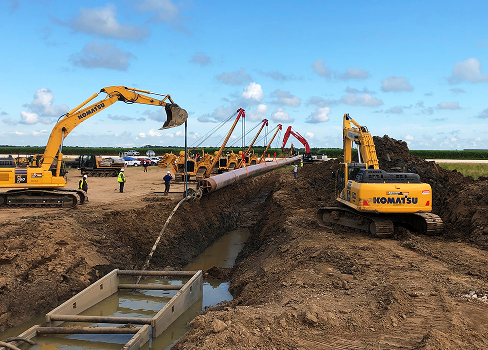The Crucial Guide to Comprehending Pipeline Construction Providers and Their Significance
Pipeline Construction solutions are basic to the transport of necessary sources such as gas, water, and oil. These services involve precise planning and implementation, sticking to strict safety and ecological requirements. As the industry adapts to contemporary difficulties, recognizing its parts and implications becomes increasingly essential. What elements add to the expanding relevance of these solutions in today's economy? The adhering to areas will discover these essential facets.
Overview of Pipeline Construction Solutions
Pipeline Construction services encompass a series of tasks essential for the setup and upkeep of pipelines used to carry numerous compounds, including gas, oil, and water. These services are critical for assuring the reliable and risk-free motion of sources from one location to an additional. The process typically begins with detailed planning and layout, which thinks about regulative demands, ecological factors to consider, and logistical challenges.
Excavation and grading of the land are performed to prepare the website for Pipeline installment when preparation is complete. This is complied with by the real laying of the pipelines, which involves welding or signing up with areas together to develop a continual flow course. After installment, rigorous testing is carried out to assure integrity and safety. Upkeep services are likewise provided to resolve any type of issues that may emerge with time. In general, Pipeline Construction services play a critical role in supporting framework for power and water distribution.
Trick Parts of Pipeline Construction
An effective Pipeline Construction project counts on numerous crucial elements that assure the safe and effective installment of the Pipeline system. First, thorough site evaluations are vital, as they recognize the environmental and geographical variables that might affect Construction. Next off, the selection of suitable products, such as fittings and pipes, is necessary for protecting toughness and compatibility with the moved substances.
Additionally, advanced Construction methods, including trenchless innovation and directional exploration, enhance performance and decrease environmental influence. Reliable job monitoring is an additional important part, working with labor, tools, and timelines to meet task goals.
Additionally, communication amongst stakeholders, consisting of designers, contractors, and neighborhood authorities, guarantees alignment on task specifications and demands. Lastly, comprehensive top quality control actions throughout the Construction procedure guarantee conformity with industry requirements and make the most of the Pipeline's functional life expectancy. Jointly, these elements develop the backbone of a successful Pipeline Construction task.
Safety And Security Requirements and Rules in Pipeline Construction

Regulatory bodies, such as the Occupational Safety and Wellness Administration (OSHA) and the Pipeline and Hazardous Products Safety Management (PHMSA), stated specific needs that regulate Construction practices. These consist of procedures for tools usage, worker training, and emergency reaction procedures. By carrying out these requirements, Construction firms not just shield their staff members but additionally secure public count on. Ultimately, rigorous precaution add to the long-lasting success of Pipeline projects, ensuring they meet both operational and environmental assumptions.
Environmental Factors To Consider in Pipeline Projects

Ecological factors to consider are important to the preparation and execution of Pipeline jobs. These jobs have to assess potential effects on ecological communities, water resources, and local wild animals. Carrying out complete ecological influence assessments (EIAs) is essential, enabling stakeholders to determine and reduce threats prior to Construction starts.
Protecting sensitive areas, such as habitats and marshes, typically calls for carrying out particular design attributes or different directing to minimize disruption. In addition, Pipeline drivers are charged with creating approaches for preventing leaks and spills, which can have devastating impacts on the environment.
Involvement with regional neighborhoods is important, as public concerns can cause job alterations that boost environmental protection. Compliance with regulations set by ecological agencies assures that jobs satisfy sustainability requirements, cultivating an equilibrium between infrastructure demands and ecological preservation. Eventually, attending to environmental factors to consider not only safeguards nature yet additionally advertises neighborhood trust fund and job stability.
The Function of Innovation in Pipeline Construction
Technology plays a vital role in modern Pipeline Construction, boosting performance and precision. Advanced checking techniques allow for specific preparation and execution, minimizing environmental influence and project delays. Additionally, the assimilation of automation and robotics simplifies operations, decreasing labor prices and improving safety and security on Construction sites.
Advanced Evaluating Methods
Advanced surveying techniques play a crucial function in the effective implementation of Pipeline Construction jobs. These methods leverage innovative modern technology to guarantee accurate mapping and analysis of the terrain where pipelines will certainly be installed. Methods such as Geographic Information Systems (GIS), LiDAR (Light Discovery and Ranging), and 3D modeling allow engineers to picture and analyze the landscape, determining environmental issues and prospective obstacles. By using these innovative devices, groups can enhance precision in placing and alignment, significantly reducing the danger of mistakes during Construction. Additionally, real-time information collection permits prompt changes and informed decision-making throughout the task lifecycle. Eventually, these checking technologies add to enhanced performance, security, and sustainability in Pipeline Construction efforts.
Automation and Robotics

Economic Impact of Pipeline Facilities
Pipeline facilities plays an essential duty in promoting and forming regional economies profession. By offering a trusted ways of moving oil, gas, and various other products, pipes reduce transportation costs and improve supply chain effectiveness. This infrastructure attracts financial investment, stimulates job development, and promotes financial growth in bordering locations.
Moreover, the Construction and maintenance of pipelines contribute substantially to local economies, creating various employment possibility in numerous industries, from design to labor. The increase of tasks usually leads to enhanced investing in neighborhood services, further reinforcing financial activity.
In addition, pipes enhance power security by ensuring a steady supply of sources, which is essential for domestic requirements and industrial operations. As areas end up being adjoined via Pipeline networks, they get accessibility to broader markets, boosting competitiveness and financial strength. The economic effect of Pipeline framework is diverse, influencing both immediate local economic climates and wider local development.
Future Trends in Pipeline Construction Services
The future of Pipeline Construction services is advancing in feedback to technological developments, governing modifications, and growing ecological considerations. Advancements such as robotics and you could look here drones are improving inspection and upkeep processes, boosting safety and effectiveness. Automation is positioned to lower labor costs and increase accuracy in Construction procedures. Additionally, the increasing emphasis on sustainability is triggering companies to take on environmentally friendly materials and practices, lining up with worldwide initiatives to minimize carbon footprints.
Regulative structures are also adjusting to address environmental impacts, promoting higher openness and responsibility in Pipeline projects. In addition, the combination of clever innovations, consisting of real-time tracking systems, is anticipated to enhance the dependability and efficiency of Pipeline networks. As power demands change towards sustainable sources, Pipeline Construction services will likely see a rise in projects related to biofuels and hydrogen transportation. Overall, these fads indicate a transformative duration for the Pipeline Construction market, focused on innovation and sustainability.
Regularly Asked Inquiries
What Sorts of Pipelines Are Commonly Built?
Various types of pipelines are generally created, including oil, water, sewer, and gas pipes - Pipeline Construction Services. Each offers distinct objectives, facilitating the transportation of necessary sources throughout regions while sticking to safety and security and environmental laws
For how long Does a Common Pipeline Project Take?
The duration of a typical Pipeline job differs considerably, often ranging from numerous months to a few years. Aspects affecting this timeline include job intricacy, regulatory authorizations, and ecological factors to consider that should be attended to.
That Controls Pipeline Construction Companies?
Pipeline Construction firms are managed by different government, state, and neighborhood agencies, including the Pipeline and Hazardous Materials Safety And Security Management (PHMSA) and state utility payments, guaranteeing conformity with safety and security and ecological criteria throughout the Construction procedure.
What Prevail Products Made Use Of in Pipeline Construction?
Usual products made use of in Pipeline Construction consist of polyethylene, pvc, and steel. Each material supplies distinctive advantages such as versatility, resistance, and toughness to deterioration, making them ideal for various click here to find out more applications in carrying fluids and gases.

Just How Are Pipeline Construction Costs Estimated?
Pipeline Construction prices are approximated by assessing aspects such as material expenses, labor prices, task intricacy, environmental factors to consider, and governing needs (Pipeline Construction Services). Accurate price evaluation assurances reliable budgeting and job planning throughout the Construction process
Pipeline Construction solutions incorporate an array of activities vital for the installation and maintenance of pipes made use of to deliver various compounds, including gas, oil, and water. A successful Pipeline Construction job counts on several essential parts that assure the efficient and safe installment of the Pipeline system. Advanced checking strategies play a necessary role in the successful execution of Pipeline Construction jobs. Various types of pipelines are frequently built, including oil, water, sewage, and gas pipelines. Pipeline Construction costs are estimated by evaluating aspects such as material expenditures, labor rates, project intricacy, ecological factors to consider, and regulative requirements.